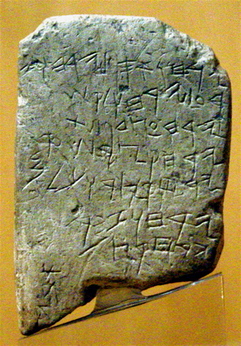The Oldest Hebrew Writing
|
About twenty miles west of Jerusalem, half way to Tel Aviv, is Gezer, one of the most excavated sites in modern Israel.
Joshua defeated the king of Gezer when the Israelites arrived in Canaan, but they “did not drive out the Canaanites” (Joshua 16:10). Years later the Egyptian pharaoh destroyed Gezer and gave the city to Solomon as a dowry for marrying his daughter. Solomon then built up Gezer as a “storage city.” R.A. Stewart Macalister, a British archaeologist, made a number of important discoveries at Gezer, but his greatest find, which he made in 1908, was not a Canaanite city wall or the home of the governor—both of which he did discover—but a small, four-inch-tall soft limestone tablet listing the agricultural seasons and farming activities. It reads: Two months of harvest Two months of planting Two months are late planting One month of hoeing One month of barley-harvest One month of harvest and festival Two months of grape harvesting One month of summer fruit The tablet’s message seems trivial. It was most likely a school child’s exercise or song. Its importance, however, is that the inscriptions are written in classic Hebrew in the tenth century BC—at the time of King Solomon, who had just received Gezer as a gift from Pharoah. |
The Gezer Calendar, as the tablet has come to be known, is considered to be the earliest physical evidence of Hebrew writing.
Of course, this claim is subject to revision as new discoveries are made. A slightly older Hebrew inscription—from the late eleventh or early tenth century BC—has been discovered in an ancient Israelite fort southwest of Jerusalem. But although archaeologists say it is ancient Hebrew, they have not yet been able to figure out what the text says. And some archaeologists say the Gezer Calendar was written not in Hebrew, but in a Phoenician dialect. |

